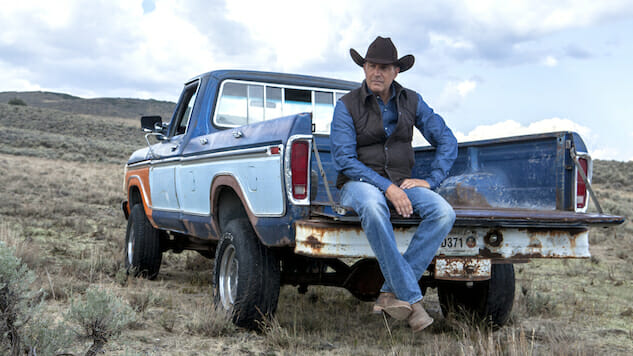Shockingly, That Kevin Costner Cowboy Drama Isn’t Any Good!
Photo: Paramount Network
If I get across nothing else in this review, make sure you understand this point: Everyone in Montana does not have a Southern accent. That Yellowstone would rather its rootin’ tootin’ ranchers drawl with the best of ’em is symbolic of its rural exoticism and co-creator, director, and writer Taylor Sheridan’s (Wind River, Hell or High Water, Sicario) need to philosophize through dusty denim.
This misfire of a family drama boasts a huge ensemble, including rich rancher John Dutton (Kevin Costner) and his brooding brood (whose names are less helpful than designations like Lawyer Son and Cowboy Son), a nameless tribal nation led by Thomas Rainwater (Gil Birmingham), land developers, ranch hands, livestock officers, cops, and elected officials. They’re all against each other somehow and there’s a lot of money and power at stake. It’s no wonder the pilot episode—one of three I screened in advance of this review—is a grueling hour and a half.
The standouts in the cast are mostly those who can handle the overwritten characters Sheridan throws at them. The growling Costner, for instance, is great at the backhanded compliment and the cutting aside. He convinces us Lawyer Son (Wes Bentley) is a disappointment while dispensing nothing but praise. Birmingham does well, too, maneuvering through GIF-ready lines like, “There’s no such thing as a good man. All men are bad,” with such offhanded acceptance that you believe his well-intentioned character is self-assured (and even a bit ironic) in his nihilist worldview.
More often, though, the actors drown in the dialogue. Dutton’s daughter (Kelly Reilly) is a too-badass mouthpiece for pseudo-Sorkin takedowns, a corporate killer with nothing behind the words. Cowboy Son (Luke Grimes) and Lawyer Son are also one-note characters, despite being positioned to have complicated personal lives. Classic rich kid daddy issues aren’t more interesting simply because they’re on horseback. The best characters are those with little dialogue, because when they finally shut up we can appreciate Sheridan’s direction.
Sheridan puts some fun flourishes into the show: Horses feel dangerous and huge (like they are), there are some gripping shots of a bison drive, and the on-location countryside looks incredible. Few directors use a truck like Sheridan. No Fast and Furious car chases here, no implicit Spielberg Americana. Sheridan takes them out of the action movie or the Truck Month commercial and makes them the oft-obsolete symbols of practical masculinity that make them so perfect for this world of macho cowboys and those moving on from them. They’re the modern posse, carrying dangerous implications in their long beds.
-

-

-

-

-

-

-

-

-

-

-

-

-

-

-

-

-

-

-

-

-

-

-

-

-

-

-

-

-

-

-

-

-

-

-

-

-

-

-

-








































